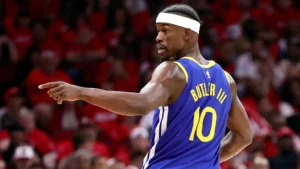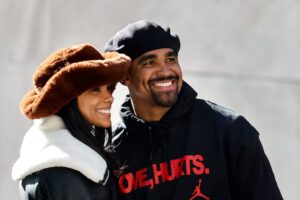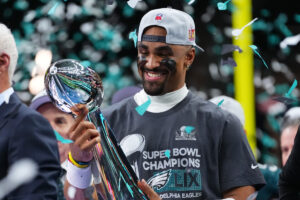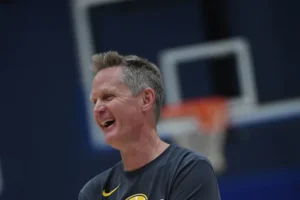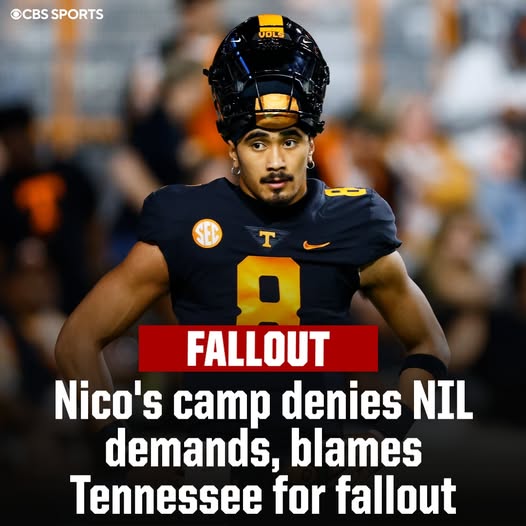
Nico’s Camp Denies NIL Demands, Blames for Tennessee Fallout
In the rapidly evolving world of college athletics, the intersection of name, image, and likeness (NIL) deals has become an increasingly contentious issue. As the landscape of college sports continues to shift, athletes and their camps find themselves navigating a new and uncharted terrain. Recently, one of the most high-profile cases in the realm of NIL negotiations involved Nico Iamaleava, a quarterback prospect who has made waves both for his football skills and the surrounding drama that has emerged due to his recruitment and NIL demands.
Nico’s journey to Tennessee and the eventual fallout between his camp and the university’s athletic program represents a broader trend in college football that blurs the lines between athleticism, business, and the ambitions of young athletes and their families. Reports have surfaced that Nico’s camp has denied making NIL demands during the recruitment process and placed the blame on the Tennessee program for the negative fallout. In examining this situation, it’s essential to break down the key elements that have contributed to this controversy and what it means for the future of college athletics.
The NIL Landscape
To fully understand the context of this situation, it is critical to first understand the broader implications of NIL deals in college sports. The NCAA’s decision to allow athletes to profit from their name, image, and likeness in 2021 marked a monumental shift in college athletics. Athletes, especially high-profile recruits, now have the ability to secure lucrative endorsement deals, sponsorships, and other forms of compensation that were once prohibited under NCAA rules.
For recruits like Nico Iamaleava, NIL presents a new set of opportunities, but also a set of challenges. With massive sums of money now on the table, recruitment has evolved into a complex web of negotiations, not just over scholarship offers and playing time, but over the potential for lucrative deals. As a result, many top athletes are reportedly seeking arrangements that will allow them to capitalize on their NIL value as soon as they step foot on campus.
However, the introduction of NIL has not come without its share of controversies. Some critics argue that it has created a “pay-for-play” atmosphere, where recruits and their families demand large sums of money as part of their commitment to a program. In response, others argue that athletes should be compensated for their work in a market-driven economy. This tension is particularly evident in the case of Nico Iamaleava.
Nico Iamaleava: A High-Profile Recruit
Nico Iamaleava, a 6’5″ quarterback from Long Beach, California, was one of the most sought-after recruits in the 2023 recruiting class. Regarded as one of the best quarterbacks in the nation, his combination of arm strength, mobility, and football IQ made him an obvious choice for top programs across the country. As he narrowed down his college choices, Tennessee emerged as a serious contender for his services, with many predicting that he would eventually commit to the Volunteers.
What made Iamaleava’s recruitment particularly intriguing, however, was the speculation surrounding his NIL demands. Reports began circulating that his camp was asking for significant financial guarantees as part of his commitment to Tennessee. These demands, while not unique in today’s NIL-centric environment, became the focal point of controversy.
The controversy surrounding these supposed NIL demands escalated further when rumors began to swirl about a falling-out between Nico’s camp and Tennessee. Sources suggested that Tennessee, while initially eager to land a recruit of Iamaleava’s caliber, was increasingly frustrated by the demands and the perceived prioritization of financial compensation over the university’s athletic program and coaching staff.
The Denial and Fallout
As the tension between Nico’s camp and Tennessee grew, representatives from Iamaleava’s side began to deny any assertions that they had made exorbitant NIL demands. According to the statements issued by Nico’s camp, the reports of financial demands were both exaggerated and misleading. They emphasized that Nico’s primary interest was always in finding the best fit for his football career and development, and that NIL opportunities were secondary in his decision-making process.
However, some of those who were familiar with the recruitment process suggest that there was indeed a negotiation over the terms of NIL opportunities, and that Nico’s camp had been proactive in seeking assurances regarding future earnings. These conflicting narratives created confusion and a rift between the two parties.
Tennessee, for its part, seemed to grow increasingly disillusioned with the situation. While they had initially rolled out the red carpet for Iamaleava, the growing sense that his commitment was tied not just to football but to financial considerations appeared to be a sticking point. Some reports suggested that Tennessee felt the need to backtrack on promises that had been made in the heat of the recruitment process, resulting in a souring of relations.
In the wake of this fallout, both sides have publicly blamed each other. Nico’s camp contends that Tennessee’s athletic department overpromised and underdelivered, leading to the eventual breakdown in negotiations. On the other hand, Tennessee insiders have pointed the finger at Nico’s camp for making NIL the primary driver of the recruitment process rather than the university’s football program and coaching staff.
This public back-and-forth has highlighted some of the growing pains that programs, players, and families are experiencing as they try to navigate the ever-changing landscape of college athletics. What was once a relatively straightforward process of recruitment based on athletic potential has now become a highly competitive and, at times, combative arena where financial incentives play a major role.
NIL and the Impact on College Football Recruiting
The Nico Iamaleava situation shines a light on the potential risks and rewards that NIL deals bring to college sports. On one hand, NIL presents an incredible opportunity for athletes to monetize their talent and create personal brands. For recruits, the allure of big-money deals can be a powerful motivator in their decision-making process, leading them to consider factors beyond just the football program’s prestige or coaching staff.
However, the involvement of NIL deals in the recruiting process also raises questions about fairness, long-term consequences, and the integrity of college athletics. As the lines between amateur and professional sports continue to blur, there is growing concern about how these financial incentives could affect team dynamics, player development, and the overall culture of college athletics.
The challenges posed by NIL have also led to concerns about the impact on the traditional recruiting process. Where once a coach’s relationship with a recruit and the opportunity for playing time were the key factors in a commitment, now those factors must be balanced with complex financial negotiations. For some programs, especially those with fewer resources or weaker NIL infrastructure, this creates an uneven playing field.
In the case of Tennessee, the program’s recruitment of Iamaleava could be viewed as a microcosm of these broader issues. As one of the more high-profile programs to become embroiled in NIL negotiations, Tennessee’s handling of the situation may serve as a cautionary tale for other schools. Balancing financial realities with athletic goals has become a delicate tightrope walk for universities, and the fallout from this high-profile recruitment debacle could have ripple effects across college sports.
Moving Forward: What Does This Mean for the Future?
As college football moves further into the era of NIL, it is clear that both recruits and athletic programs will need to adapt to a new set of dynamics. For players like Nico Iamaleava, NIL deals will continue to play a pivotal role in shaping their career trajectories and choices. The financial opportunities presented by NIL can no longer be ignored, and they will undoubtedly become a central focus for many top recruits.
For universities, the need to establish clear, transparent, and fair NIL policies will be crucial in maintaining strong relationships with recruits and avoiding public controversies. The rising tension between Nico’s camp and Tennessee underscores the necessity of managing expectations and setting realistic boundaries in the recruitment process.
Ultimately, the fallout from Nico Iamaleava’s recruitment saga may be seen as a pivotal moment in the history of college athletics, where NIL negotiations and the pursuit of financial gain took center stage. As the market for NIL continues to evolve, it will be interesting to see how future recruitments unfold, and whether a more standardized approach to NIL deals emerges in order to prevent similar conflicts.
In the end, the key takeaway is that NIL has changed the game in ways that no one could have anticipated. For players, it’s no longer just about touchdowns and championships—it’s about crafting a lucrative and sustainable brand. For schools, it’s about balancing business interests with the spirit of competition and ensuring that the integrity of the game remains intact.
Whether or not this case represents a long-term trend in college football remains to be seen, but one thing is certain: the intersection of NIL, recruitment, and athletic competition is a new frontier that will continue to shape the future of college sports.
